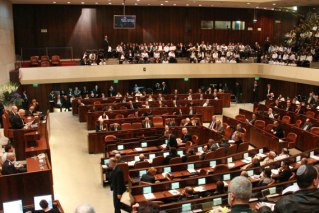 The Knesset plenum, photo by Itzik Edri
The Knesset plenum, photo by Itzik Edri
The focus of the upcoming session will undoubtedly be passing the national budget, which we expect to be released in the coming weeks. In relation to this, ACRI recently wrote to the Finance Minister urging him not to cut child allowances without conducting a comprehensive review of support and allowance programs in order to better adapt them to the recipients’ real needs.
ACRI is working together with other organizations, activists and Knesset members to go over the budget and map out the potential human rights violations contained within, and will act to contain them.
In preparation for the new Knesset, ACRI produced a comprehensive briefing paper on the legislative trends we saw over the last four year, to offer an insight into what we may expect from the 19th Knesset.
To receive the Knesset Roundup directly to your email, sign up here.

|
Negev Bedouin Land Ownership
Ministerial Committee on Legislative Affairs | Sunday, 21.04.2013 | Deciding the government’s position. ACRI’s position: ACRI, together with Bimkom – Planners for Planning Rights, have been dealing for many years with the issue of Bedouin rights in the Negev in all fields of life. The proposed bill below primarily deals with the issue of Bedouin land ownership in the Negev.
The bill suggests an arrangement whereby the registration of land claims takes place within a specified time; recognition will be given for only a percentage of the claims and financial compensation will be provided for land recognized by the arrangement.
Our main reservations regarding this proposed law are:
According to our position, an equitable and just solution requires firstly recognizing that the residents of the unrecognized villages are citizens with equal rights. The government must recognize the 35 currently unrecognized villages, and institute a fair mechanism for investigating and determining land ownership claims, in which the historical affiliations of the Bedouin citizens to their land are considered.
Related Material
|
|
Possession of weapons by security guards outside of working hours
Internal Affairs and Environment Committee | Tuesday, 23.04.13 | 11:30am | Committee Discussion
ACRI’s Position: This issue has been promoted by a coalition of women’s and human rights organizations: The Gun on the Kitchen Table (of which ACRI is a member).
Our goal is to bring to an end to security guards taking their weapons into the domestic sphere due to the fact that it brings about an increase in violence against women in particular, and violence in general. The coalition was established in response to the frequent occurrences of women being killed by weapons carried by their partners who work in the security industry.
Article 10 of the Firearms Laws (1949) provides that an authorization to carry weapons issued by a security company to one of its guards will be limited to the area where the guard is employed. In other words, the guard is not authorized by law to carry his weapon with him following the conclusion of his shift. The Firearms Registration Division additionally determined that: “weapons will be provided only to meet the needs of a position, the weapon will be provided at the start of a shift and taken away at the end of the shift.” Despite the clear directions of the law, this is not being implemented in practice.
Statistics point to a recurring phenomena of homicides committed after hours by security guards using the weapon that they receive from their place of work.
Most of these murders could be prevented if security companies were made to act as required by law.
To this end, ACRI has sent a letter to committee chairwoman MK Miri Regev. |
|
Alcohol Law
Ministerial Committee on Legislative Affairs | Sunday, 21.04.2013 | Deciding the government’s position.
ACRI’s position: The stated purpose of this bill is to deal with problem of drunkenness, especially among youths, and knock-on effects of the disturbance of public order and safety – by restricting the drinking of alcohol in public places, including in vehicles in public spaces. The law gives police a sweeping authority to confiscate and pour out drinks in public places from 9pm to 6am, or in cases where the drinker is a minor not accompanies by an adult family member. In any other case, it is up to the police’s discretion as to whether reasonable grounds exist to think that drinking will lead to a disturbance in public order, in which case they can confiscate the drink or pour it out. The law was passed as a temporary measure on March 17, 2010, and now the Ministry of Public Security has requested that the legislation be made permanent.
ACRI explained to the Ministry of Public Security its opposition to the transformation of the measure into a permanent law. ACRI’s opposition to the law focuses on articles 2 and 3 of the law in which excessively broad powers are granted to the police, powers which contain potential for human rights violations. This arrangement grants authority to police officers to confiscate and destroy people’s private property, who by all accounts have acted legally, based only on speculation as to what they may do in the future. There is room for concern that these powers would be utilized in a discriminatory manner against groups such as the homeless, minors, minorities and others who are perceived by the police officers as ‘problematic’ for one reason or another.
The law does insert any checks or balances over this broad authority. |
To receive the Knesset Roundup directly to your email, sign up here.







